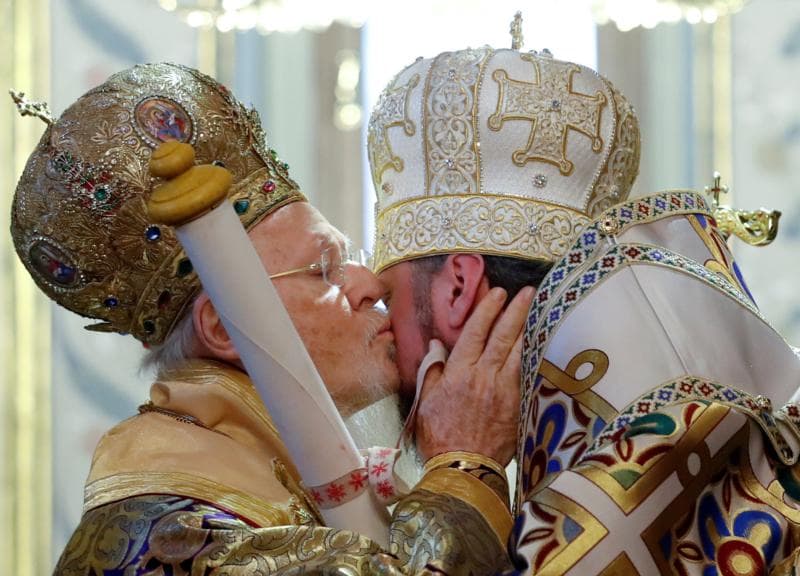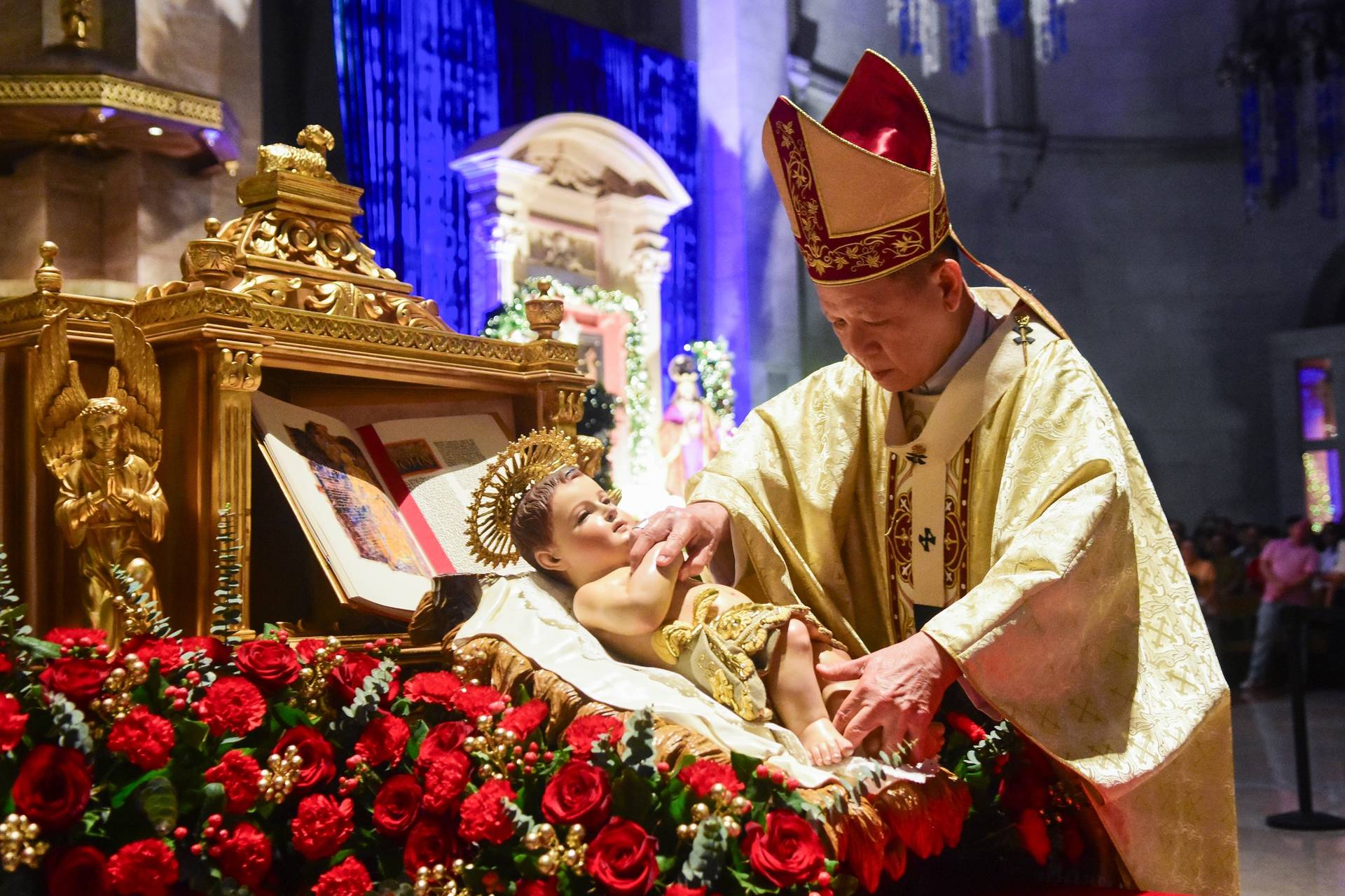[Editor’s note: This is part one of Elise Harris’s conversation with Bishop Borys Gudziak of the Ukrainian Greek Catholic Church. In part two, Gudziak discusses the approach to the clerical sexual abuse scandals in the Eastern Catholic Church.]
ROME – A leading Ukrainian Catholic bishop has said a recent declaration of independence for the Ukrainian Orthodox Church amounts to a refutation of what he called Russia’s “ecclesial colonialism,” and roundly condemned efforts to placate Russian sensitivities as part of Catholic-Orthodox relationships.
“Bending before nuclear powers has little to do with authentic reconciliation of churches,” Said Greek Catholic Bishop Borys Gudziak. “Saber-rattling by churches backed by nuclear power has little to do with true ecumenism.”
In comments to Crux, Gudziak, who heads the Ukrainian Greek Catholic Eparchy of Paris, said the recent recognition of the independence, or “autocephaly,” of the Ukrainian Orthodox Church “is a stark refutation of ecclesial colonialism, something almost no church today dares to preach.”
“Before the developments of the last months, the communion of 14 autocephalous Orthodox Churches did not include Ukraine. According to the Russian Orthodox Church, these Churches and faithful were deprived of grace, without hope for salvation unless they repented and rejoined.”
However, with the Orthodox Church in Ukraine being the second largest in the Orthodox community post-independence, Borys said he believes it’s only a matter of time before the decision is commonly accepted, and as such, “the sooner Russian Orthodox realize that colonization is not an evangelical principle the better their own ecclesiastical and spiritual life will be.”
In November 2018, Patriarch Bartholomew I of Constantinople approved a tomos, or decree, granting the Ukrainian Orthodox Church independence from the Russian Orthodox Church. It marked a historic step for Ukraine, which had been considered part of the “canonical territory” of the Russian Orthodox for centuries.
Ukraine currently has three Orthodox communities – one still under Moscow’s control, and two independent churches. The push for the independence of the Ukrainian Orthodox Church has been a source of tension for years, which was exacerbated following Russia’s 2014 annexation of the Crimean Peninsula and its support of separatist rebels in eastern Ukraine.
In December a “Unification Council” called by Bartholomew was held in Kiev, resulting in the election of Metropolitan Epiphany as the head of the newly-independent church.
In his interview with Crux, Gudziak said restructuring following the independence vote will last for years, and while the position of the broader Orthodox community will become clearer in the coming months, independence will eventually be widely accepted – though not, he warned, without a fight.
He also spoke of Orthodoxy in Macedonia, Bulgaria and Romania, all majority Orthodox nations that will be visited by Pope Francis this spring, as well as Francis’s historic meeting with Russian Orthodox Patriarch Kirill in Havana, Cuba, in 2016.
Calling the meeting a mere “photo opportunity” that boosted Kirill’s status, Borys said that since then, there’s been “little progress in ecumenical relations.”
“Ecumenism cannot be power politics or secular diplomacy,” he said. “In Jesus’ teaching, might does not make right,” he said.
Below are excerpts of Crux’s conversation with Gudziak.
What impact has the approval of autocephaly for the Orthodox Church in Ukraine had in the wider Orthodox world? What are the possible consequences of this decision at both a religious and geopolitical level?
The recognition of the autocephaly of the Orthodox Church in Ukraine (OCU) has rendered undeniable some basic facts. It is a belated acknowledgement of a fundamental reality in the Orthodox world. Orthodox Ukrainians exist – in great number – and many reject colonial submission, ecclesial or otherwise.
Not many realize that taken together, the Orthodox in Ukraine constitute the second biggest Orthodox community in the world. Often one can read that the Russian Orthodox Church (ROC) is the largest of the Orthodox churches and that it constitutes a plurality of global Orthodoxy. But when the ROC speaks in these terms it always subsumes the Orthodox of Ukraine. If practicing Orthodox are counted, probably half of those in the ROC are Ukrainian or of Ukrainian ancestry.
Before the developments of the last months, the communion of 14 autocephalous Orthodox churches did not include an autocephalous Orthodox Church of Ukraine. According to the ROC these churches and faithful were deprived of grace, without hope for salvation unless they repented and rejoined the ROC. The recent recognition of the autocephaly of the Orthodox church is a stark refutation of ecclesial colonialism, something almost no Church today dares to preach.
The sooner Russian Orthodox realize that colonization is not an evangelical principle, the better their own ecclesiastical and spiritual life will be. Of course, history has shown that colonizers rarely relinquish their subjects willingly or easily, be it political, cultural, or ecclesiastical colonization.
The ROC has formally broken off communion with the Patriarchate of Constantinople. There will be tension between those Orthodox churches that follow Constantinople and those that do not. (However), the autocephaly of the second biggest Orthodox church is quite natural and, sooner or later, will be recognized by all. It may take decades, but historical precedent suggests that this process is irreversible.
What impact will it have on Ukrainian society generally?
Hopefully it will make Orthodoxy in Ukraine freer and more effective to address the spiritual and pastoral needs of Ukrainian society. Like all societies, cultures, or races that have endured historical trauma, the scars and complexes in Ukraine run deep. The Orthodox Church of Ukraine has a long way to go not only to restructure itself but to really liberate and purify itself of the Soviet and Russian imperial legacy.
Becoming a unified autocephalous Church that is an effective evangelizer in a post-communist, post-modern society will not happen overnight. We are talking about decades of future endeavors.
It should be clear that Moscow is doing everything in its power to obstruct and derail this process. No means are beyond the pale. To try to reestablish control over Ukraine, five years ago Russia invaded the country and militarily annexed Crimea. Orthodox are killing Orthodox – members of their own church. More than 10,000 persons have died as a result of the ongoing war. Hundreds of thousands have lost their homes and have become refugees. The imperial ambitions, political or ecclesiastical, will not go away easily or soon.
In terms of Orthodox relations with the Vatican, do you think this decision will hurt the Holy See’s relationship with Moscow? Could it possibly cause relations to go backwards, following the historic meeting between Pope Francis and Patriarch Kirill in 2016?
In recent decades, Moscow has often formulated its demands – particularly regarding processes in Ukraine— in categorical terms: either you do what we want, or we will cut off relations. The Holy See’s reaction is usually cautious. In recent years the Holy See has not publicly challenged the Church of Moscow. It seems back door efforts have been applied, but at least regarding the position of the ROC and its non-response to Putin’s war in Ukraine, we see little effect. It is difficult to say what will happen, but I hope that truth and justice will prevail.
It is important not to overestimate the impact of the 2016 Havana meeting of the Pope and Patriarch Kirill. The two church leaders met, the meeting gave Kirill an historical photo opportunity which served to raise his status in Russia and particularly in the West, but subsequently we see very little progress in ecumenical relations.
Ecumenical relations can authentically develop only in the framework of profound Gospel principles. Ecumenism cannot be power politics or secular diplomacy. In Jesus’ teaching, might does not make right. Bending before nuclear powers has little to do with authentic reconciliation of churches. Saber-rattling by churches backed by nuclear power has little to do with true ecumenism.
How would you evaluate the Vatican’s strategy when it comes to Orthodox relations?
The strength of the Holy See when it comes to Orthodox relations is always connected with the authenticity of Christian witness of the Catholic Church. When the Church is strong morally it can make a contribution to the entire world, including the Orthodox community. When it is weak or burdened by internal contradictions, its witness becomes less convincing.
Today, Pope Francis seeks to speak in the name of the poor, calling his church and the global community to reevaluate many positions and postures. For any community or institution, reform is an arduous process. The Catholic Church today is conducting such a reform.
Exactly where do the Orthodox churches in Romania, Macedonia, and Bulgaria stand? How influential are they, and what has their reaction to this decision been?
The Romanian Orthodox Church is a community that was able to develop its theological life and church institutions in communist times. Romanian communist authority, the Ceausescu regime, also charted a somewhat independent course. Consequently, today Romanian Orthodoxy has a rather vibrant ecclesial life and its leaderships makes rather free decisions.
The Macedonian Orthodox Church is seeking recognition as its proclaimed autocephaly is not yet accepted by other Orthodox churches and it is a hostage to the whole issue of the name of the country [it cannot be called simply Macedonia because that is the name of the bordering part of Greece], which causes disputes with Greek Orthodox.
The autocephaly of the Church in Ukraine and resolution of the conflict over Macedonia’s name as a country are probably the preconditions for recognition of the Macedonian Orthodox Church.
Bulgaria has traditionally been in the Russian sphere of influence, but politicians and representatives of Bulgarian society strongly rebuked Patriarch Kirill for his condescending attitude towards Bulgarians and their church.
In each of these cases there is a complex ecclesial and national history behind the position of individual Orthodox churches. As history changes, these positions evolve.

















